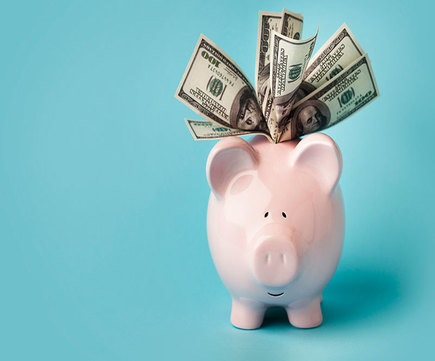Should You Save in USD? Advantages and Disadvantages
Saving
28/05/2025
Find out whether saving in USD is a good option for you. Explore the advantages and disadvantages of USD savings to make informed financial decisions.
In the context of volatile global economies, saving in USD has garnered increasing interest from many individuals. It is often considered a safe investment channel with potential for returns. So, should you save in USD? Below, VPBank will analyze the advantages and disadvantages of USD savings, helping you make an informed decision.
1. Advantages and Disadvantages of USD Savings
To determine whether saving in USD is suitable, it's essential to understand the pros and cons of this savings method:
1.1. Advantages
Financial Stability: The USD is a strong and relatively stable currency. Saving in USD provides peace of mind as your assets are protected from market fluctuations or the depreciation of local currency.
Mitigating Exchange Rate Risk: If you reside in a country with an unstable economy, holding USD can help avoid losses due to sudden exchange rate changes.
Flexible Currency Reserve: Saving in USD not only serves as a deposit but also allows you to hold foreign currency for travel, investment, or international transactions without concerns about exchange rate volatility.
Key Advantages of USD Savings
1.2. Disadvantages
Lower Interest Rates: USD deposits typically offer lower interest rates compared to local currency deposits, meaning returns might not be as high as expected.
Conversion Fees: When converting USD back to local currency, individuals may incur additional fees, which can reduce the overall benefit of the savings.
Liquidity Limitations: USD accounts may have more stringent procedures and conditions for withdrawals, causing inconvenience if you need urgent access to funds.
See also: What is a savings passbook? Conditions for opening, benefits, and how to differentiate.
2. USD Savings - To Deposit or Not?
Deciding whether to save in USD is a significant choice that depends on an individual's financial goals, personal needs, and risk tolerance. If you prioritize safety and stability for your funds and are not solely focused on high interest rates, then saving in USD could be a suitable solution.
Saving in USD offers peace of mind, protecting asset value against unexpected fluctuations in the financial market or the depreciation of the local currency. This is particularly relevant for those aiming to build a long-term financial plan, prioritizing certainty over high short-term profits.
Should one save in USD?
Although interest rates on USD deposits are generally lower than those for local currency deposits, the stability and reliability of the USD can be a significant advantage, especially for those seeking to preserve their assets over time. Therefore, choosing to save in USD is most appropriate when carefully weighing personal needs against the desire for financial protection.
Learn more: Detailed guide on high-yield online savings
3. Tips for USD Savings
After understanding whether saving in USD is advisable and deciding to proceed, consider the following key points:
3.1. Hình thức gửi tiết kiệm USD
3.1. Types of USD Savings Accounts
When you decide to deposit USD at a bank, there are two primary options: time deposits and demand deposits. Each type has its own advantages and limitations:
Time Deposits (Term Deposits): Fixed-term deposits are a popular choice for those who do not require immediate access to their funds and wish to earn higher interest rates. Generally, the longer the deposit term, the higher the interest rate. However, you typically cannot withdraw funds before maturity without incurring penalties.
Demand Deposits (Non-Term Deposits): If you require flexibility in withdrawing funds, a demand deposit account is a suitable option. Interest rates are usually lower than for time deposits, but you can withdraw funds at any time without incurring penalties.
Common Types of USD Savings Accounts
3.2. Tenors for USD Savings
The deposit tenor not only impacts the interest rate but also affects how you manage your personal finances:
Short-Term Tenors (Under 1 year): These typically offer lower interest rates but provide high flexibility for quick withdrawals. This is a good option for situations requiring financial liquidity in the short term.
Medium-Term Tenors (1-2 years): These provide stable interest rates, neither too high nor too low, while still maintaining some flexibility for cash access. This is an ideal choice for those seeking to ensure financial stability over a moderate period.
Long-Term Tenors (Over 3 years): These usually come with the highest interest rates but require a commitment to keep funds deposited for an extended period. This option is suitable for those planning long-term investments and not needing to access the money in the near future. With patience, you have the opportunity to earn higher interest rates on your savings.
See also: Which bank offers the highest savings interest rates today? [April 2025]
-
- Choosing the Best Bank for USD Savings
Xem thêm: Lãi suất tiết kiệm ngân hàng nào cao nhất hiện nay? [4/2025]
4. Choosing the Best Bank for USD Savings
When selecting a bank for USD savings, besides interest rates, several other factors require careful consideration:
Bank Reputation and Reliability: This is the most crucial factor, especially when depositing substantial amounts. Choosing a highly reputable bank ensures greater peace of mind regarding the safety and security of your funds.
Associated Costs: Interest rates are not the only factor to consider. You should also pay attention to various fees such as account opening fees, maintenance fees, and withdrawal fees. Some banks might offer lower interest rates but waive these fees, so a thorough comparison is necessary for a rational choice.
Customer Service Quality: A bank with excellent customer service will help you resolve any issues quickly and efficiently. Particularly, in case of incidents or when needing account support, a professional support team is highly important.
Online Convenience: A bank's online tools enable easy remote monitoring and management of your account. This not only saves time but also helps you manage your personal finances more effectively and conveniently.
Choose a Reputable and Reliable Bank for USD Deposits
5. Procedures for Opening a USD Savings Account at a Bank
To open a USD savings account at a bank, you need to follow some simple yet important steps:
Personal Identification: You will need to present your Identity Card or Passport to verify your identity.
Account Opening: If you do not already have an account with the bank, you will need to open a new one. This may require additional documents such as utility bills or proof of residence.
Minimum Deposit Amount: Each bank will require a minimum amount to open a USD savings passbook, and this amount may vary depending on the bank's policy and the type of savings chosen.
Complete the Savings Application Form: You will need to fill out an application form specifying the deposit amount, tenor, and currency you wish to deposit.
Select Tenor and Interest Rate: Choose the savings tenor based on your financial goals. Generally, longer tenors offer higher interest rates.
Sign the Savings Agreement: After agreeing to the terms and conditions, you will sign a contract with the bank. Before signing, remember to read carefully and ensure you understand all clauses in the agreement.
USD Savings Deposit Process and Procedures
You might also be interested in:
Top 10 banks with the highest savings interest rates
Unsecured loans - Consumer loans for salaried customers
Mortgage loans against savings passbooks at VPBank with disbursement in 1 minute
By now, you should have a clear understanding of whether saving in USD is right for you. It can be a reasonable choice if you aim to diversify your assets and leverage the stability of this currency. However, it is crucial to carefully consider potential exchange rate risks and regulatory requirements. The final decision depends on your financial goals and risk tolerance. Please visit www.vpbank.com.vn or call our hotline 1900.54.54.15 for more specific advice on your situation.



![Which Bank Offers the Highest Savings Interest Rates? [May 2025]](/-/media/tin-tuc/2025/7fa2aaa9fbf041209316266b69dedbd7.png)
